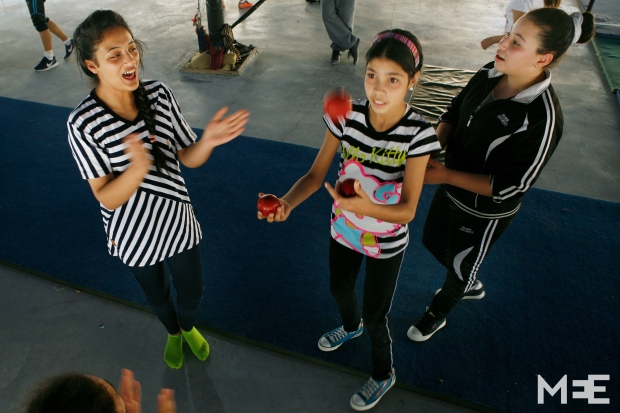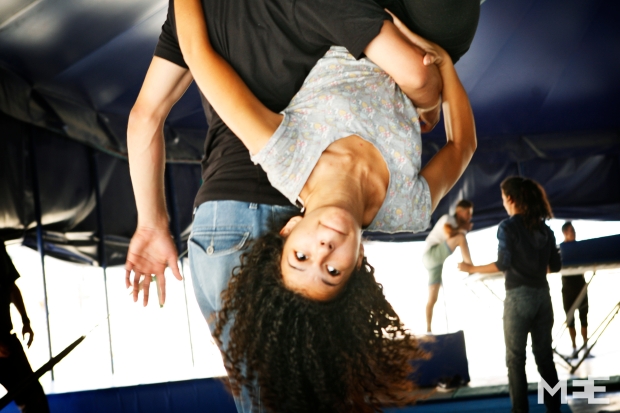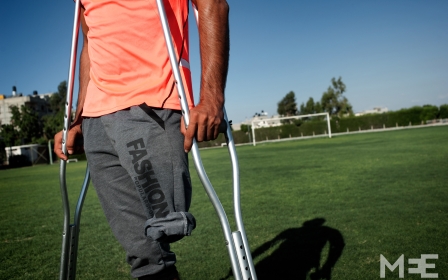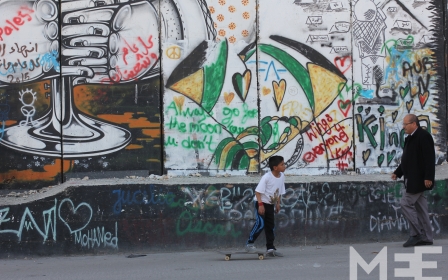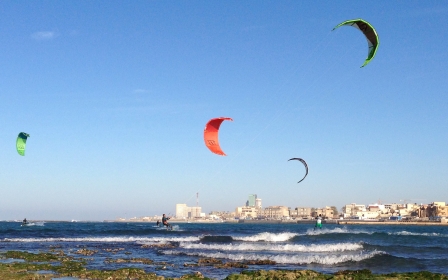The Palestinian Circus School
Classes are held in Jenin, Hebron and al-Fara Refugee Camp. They attract close to 200 children every year
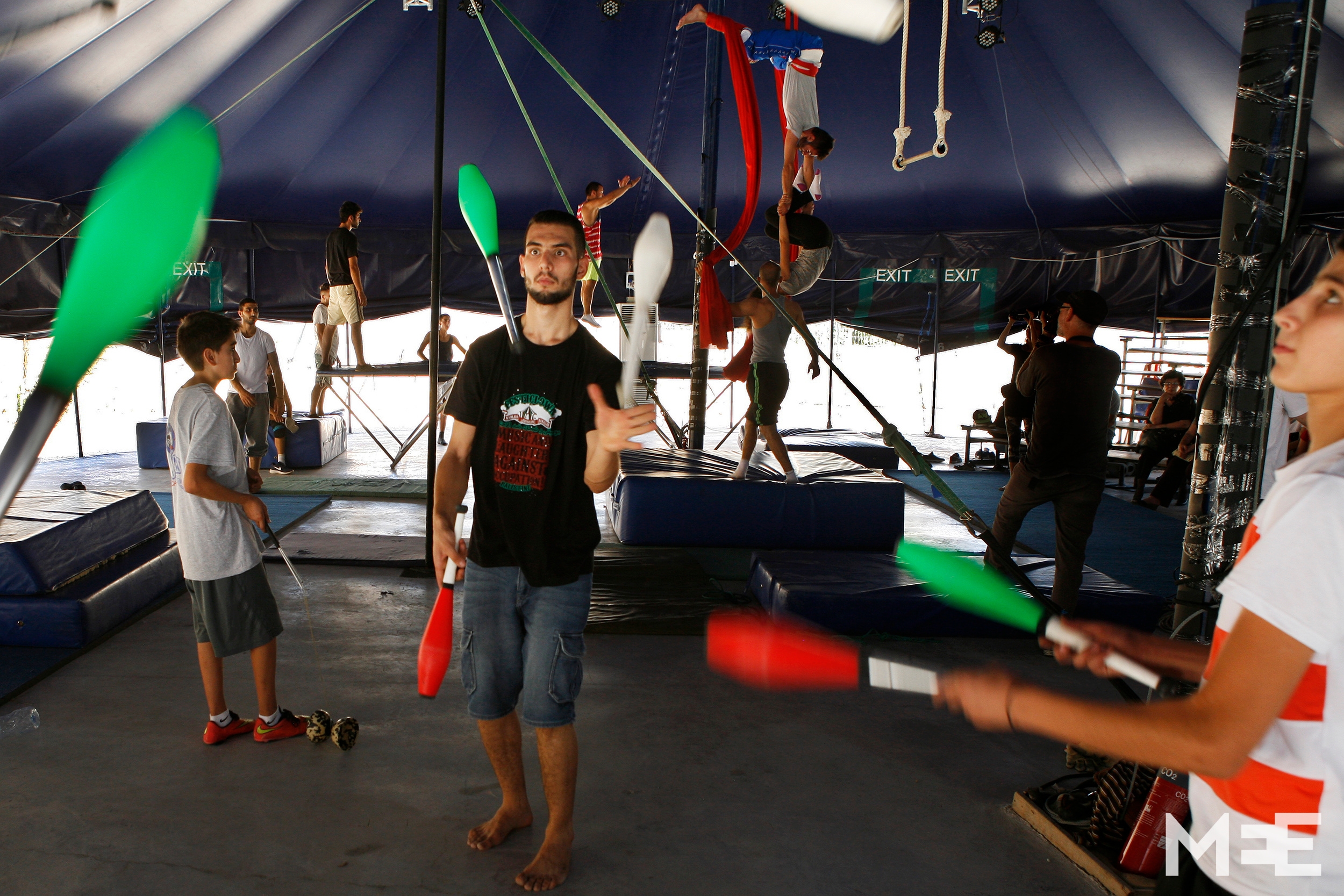
Hamada Toqan began juggling in 2007 with the Palestinian Circus School. Here he trains young students. (MEE/ Silvia Boarini)
Published date: Jeudi 24 septembre 2015 - 23:27
|
Last update: 9 années 2 mois ago
RAMALLAH, Occupied Palestinian Territories - On a breezy night in the Palestinian village of Birzeit, north of Ramallah, rows of screaming children unable to contain their excitement are making their way inside a circus tent. As they climb to their places on the elevated wooden benches in front of the ring, the lights go down and the dream begins.
The tent has been the official home of Palestine's Circus School since 2011. The school was founded by Shadi Zmorrod and Jessika Devlieghere in 2006. Back then, the juggling and acrobatics classes were attended by 10 or 20 students. Today, the classes are held in Jenin, Hebron and al-Fara refugee camp in the Jordan Valley. They attract close to 200 children every year.
“Circus was a dream for me,” the school’s general director Shadi Zmorrod told Middle East Eye.
Zmorrod studied performing arts at Hebrew University and for a while worked as an artistic director at a Jewish-Arab circus school in Israel. But the experience, he says, left him sceptical about talk of "equality" and "coexistence".
“Israeli leftists say they want to live together, but they want to change you, not themselves,” he explained.
That’s when he decided to focus on Palestine and on improving the situation in his own community.
“Here you have Palestinian kids playing in the street,” Zmorrod said. “And often they leave school to sell chewing gum because their parents or brothers can’t get a permit to work in Israel.”
In founding the school, Zmorrod and Devlieghere were also hoping to found a safe haven for these kids.
In its nine years of existence, though, the school has hardly been immune to the effects of the conflict. It has seen the violence of the ongoing occupation intersect with the private lives of its students.
In 2014, 15-year-old Mohammed Azzeh, a young acrobat, was shot in the chest by an Israeli soldier during a protest commemorating the Nakba. Two years prior, 17-year-old Muhammad as-Salaymeh, a veteran at the school, was shot dead by an Israeli border guard at a checkpoint in Hebron on the day of his birthday.
For Mohammed’s sister, Hazara Azzeh, a performer herself, what is shocking is coming to terms with the banality of the violence. “It’s all a waste; it has became part of our daily life,” she told MEE. “If there’s a martyr today, we just bury him and move on.”
In this sense, the fact that the circus often tours Europe means that in staging their shows - which address the trials of daily life under occupation in front of a foreign audience - the kids are reminded that for most people being shot by an occupying army is not a normal occurrence.
Aside from the ongoing conflict, there are also internal cultural hurdles that the performers face. For example, Azzeh is the only 18-year-old female student. Due to conservative social norms, she explains, girls tend to drop out when they reach 15 or 16 years of age.
She remembers a time when her acrobatics routine could not be performed in some of the villages visited by the circus. “It felt like all my work had gone to waste,” she said. “I would hear comments like, 'But she’s a girl and she’s old - what is she doing?'"
Sheer perseverance and the support of her family, friends and fellow performers has helped her through and in the past couple of years, she has returned to perform in some of the villages that couldn’t handle her presence in the past.
“It’s part of the message I am trying to give,” she said, “that any girl can do this, I am not doing anything wrong”.
The fact that change comes slowly doesn’t scare anyone at the circus - the commitment they have made is for the long term.
“We Palestinians need to change and the Israelis need to change,” Zmorrod said. “We are talking about something huge that will not happen in our lifetime.” But the circus school is there to support the process.
Middle East Eye propose une couverture et une analyse indépendantes et incomparables du Moyen-Orient, de l’Afrique du Nord et d’autres régions du monde. Pour en savoir plus sur la reprise de ce contenu et les frais qui s’appliquent, veuillez remplir ce formulaire [en anglais]. Pour en savoir plus sur MEE, cliquez ici [en anglais].


